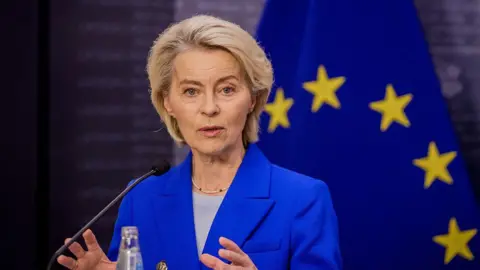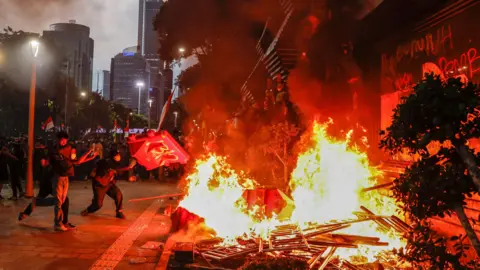Romania is preparing for an unprecedented election, following the dramatic cancellation of presidential elections last December, which led to public protests and political upheaval. The controversial annulment was largely attributed to allegations of Russian meddling, dubious TikTok accounts, and illicit payments made to online influencers. Despite Moscow’s claims of innocence, the political atmosphere remains charged.
With far-right candidate Calin Georgescu barred from participating and facing allegations—including an attempted overthrow of the constitutional order—the focus shifts to the emerging frontrunner, George Simion of the AUR party, along with competitors from the National Liberal Party, Crin Antonescu, and independent candidate Nicușor Dan.
At the heart of this crisis lies the accusation that TikTok influencers played a crucial role in boosting Georgescu's campaign through social media manipulations. Previously polling at a mere 3-5%, Georgescu’s TikTok presence surged dramatically in the lead-up to the elections, resulting in an unexpected 23% of votes in the first round. Experts suggest this sudden rise was artificially orchestrated, aligning with the tactics used in previous Russian election interference strategies.
Authorities have accused influencers of facilitating Georgescu's visibility on TikTok through paid promotional content. Cascading videos echoed a call for stability, yet cleverly avoided direct endorsements—an act contradicting TikTok’s advertising policies. Several influencers have since claimed ignorance regarding the political intentions behind their actions, insisting they just encouraged youth voter turnout.
This complicated narrative further escalated with revelations connecting the #stabilityandintegrity campaign to the National Liberal Party (PNL), which had backed its own candidate. The scandal deepened following the arrest of prominent influencer Bogdan Peschir—nicknamed the "King of TikTok"—for allegedly using financial incentives to manipulate voter behavior.
As investigations continue, both at the local and European levels, a sense of frustration emerges among citizens yearning for transparency, especially concerning potential foreign interference. With ambiguous evidence and a convoluted web of influencers, the path toward clarity could be long and intricate.
Beyond the scandal itself, many question the broader implications for democracy and election integrity in an age dominated by social media narratives. As the results unfold, observers brace for the potential ramifications this could have on public trust in political processes for years to come.
With far-right candidate Calin Georgescu barred from participating and facing allegations—including an attempted overthrow of the constitutional order—the focus shifts to the emerging frontrunner, George Simion of the AUR party, along with competitors from the National Liberal Party, Crin Antonescu, and independent candidate Nicușor Dan.
At the heart of this crisis lies the accusation that TikTok influencers played a crucial role in boosting Georgescu's campaign through social media manipulations. Previously polling at a mere 3-5%, Georgescu’s TikTok presence surged dramatically in the lead-up to the elections, resulting in an unexpected 23% of votes in the first round. Experts suggest this sudden rise was artificially orchestrated, aligning with the tactics used in previous Russian election interference strategies.
Authorities have accused influencers of facilitating Georgescu's visibility on TikTok through paid promotional content. Cascading videos echoed a call for stability, yet cleverly avoided direct endorsements—an act contradicting TikTok’s advertising policies. Several influencers have since claimed ignorance regarding the political intentions behind their actions, insisting they just encouraged youth voter turnout.
This complicated narrative further escalated with revelations connecting the #stabilityandintegrity campaign to the National Liberal Party (PNL), which had backed its own candidate. The scandal deepened following the arrest of prominent influencer Bogdan Peschir—nicknamed the "King of TikTok"—for allegedly using financial incentives to manipulate voter behavior.
As investigations continue, both at the local and European levels, a sense of frustration emerges among citizens yearning for transparency, especially concerning potential foreign interference. With ambiguous evidence and a convoluted web of influencers, the path toward clarity could be long and intricate.
Beyond the scandal itself, many question the broader implications for democracy and election integrity in an age dominated by social media narratives. As the results unfold, observers brace for the potential ramifications this could have on public trust in political processes for years to come.




















